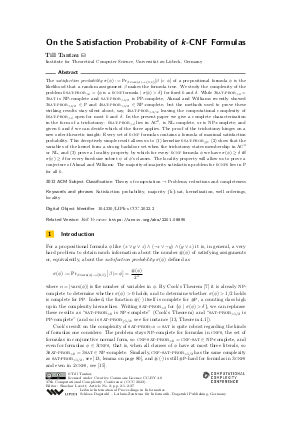On the Satisfaction Probability of k-CNF Formulas
Author Till Tantau
-
Part of:
Volume:
37th Computational Complexity Conference (CCC 2022)
Part of: Series: Leibniz International Proceedings in Informatics (LIPIcs)
Part of: Conference: Computational Complexity Conference (CCC) - License:
 Creative Commons Attribution 4.0 International license
Creative Commons Attribution 4.0 International license
- Publication Date: 2022-07-11
File

PDF
LIPIcs.CCC.2022.2.pdf
- Filesize: 0.88 MB
- 27 pages
Document Identifiers
Related Versions
- Full Version https://arxiv.org/abs/2201.08895
Subject Classification
ACM Subject Classification
- Theory of computation → Problems, reductions and completeness
Keywords
- Satisfaction probability
- majority it{k}-sat
- kernelization
- well orderings
- locality
Metrics
- Access Statistics
-
Total Accesses (updated on a weekly basis)
0Document
0Metadata
Abstract
The satisfaction probability σ(ϕ) := Pr_{β:vars(ϕ) → {0,1}}[β ⊧ ϕ] of a propositional formula ϕ is the likelihood that a random assignment β makes the formula true. We study the complexity of the problem kSAT-PROB_{> δ} = {ϕ is a kCNF formula ∣ σ(ϕ) > δ} for fixed k and δ. While 3SAT-PROB_{> 0} = 3SAT is NP-complete and SAT-PROB}_{> 1/2} is PP-complete, Akmal and Williams recently showed 3SAT-PROB_{> 1/2} ∈ P and 4SAT-PROB_{> 1/2} ∈ NP-complete; but the methods used to prove these striking results stay silent about, say, 4SAT-PROB_{> 3/4}, leaving the computational complexity of kSAT-PROB_{> δ} open for most k and δ. In the present paper we give a complete characterization in the form of a trichotomy: kSAT-PROB_{> δ} lies in AC⁰, is NL-complete, or is NP-complete; and given k and δ we can decide which of the three applies. The proof of the trichotomy hinges on a new order-theoretic insight: Every set of kCNF formulas contains a formula of maximal satisfaction probability. This deceptively simple result allows us to (1) kernelize kSAT-PROB_{≥ δ}, (2) show that the variables of the kernel form a strong backdoor set when the trichotomy states membership in AC⁰ or NL, and (3) prove a locality property by which for every kCNF formula ϕ we have σ(ϕ) ≥ δ iff σ(ψ) ≥ δ for every fixed-size subset ψ of ϕ’s clauses. The locality property will allow us to prove a conjecture of Akmal and Williams: The majority-of-majority satisfaction problem for kCNFS lies in P for all k.
Cite As Get BibTex
Till Tantau. On the Satisfaction Probability of k-CNF Formulas. In 37th Computational Complexity Conference (CCC 2022). Leibniz International Proceedings in Informatics (LIPIcs), Volume 234, pp. 2:1-2:27, Schloss Dagstuhl – Leibniz-Zentrum für Informatik (2022)
https://doi.org/10.4230/LIPIcs.CCC.2022.2
BibTex
@InProceedings{tantau:LIPIcs.CCC.2022.2,
author = {Tantau, Till},
title = {{On the Satisfaction Probability of k-CNF Formulas}},
booktitle = {37th Computational Complexity Conference (CCC 2022)},
pages = {2:1--2:27},
series = {Leibniz International Proceedings in Informatics (LIPIcs)},
ISBN = {978-3-95977-241-9},
ISSN = {1868-8969},
year = {2022},
volume = {234},
editor = {Lovett, Shachar},
publisher = {Schloss Dagstuhl -- Leibniz-Zentrum f{\"u}r Informatik},
address = {Dagstuhl, Germany},
URL = {https://drops.dagstuhl.de/entities/document/10.4230/LIPIcs.CCC.2022.2},
URN = {urn:nbn:de:0030-drops-165648},
doi = {10.4230/LIPIcs.CCC.2022.2},
annote = {Keywords: Satisfaction probability, majority it\{k\}-sat, kernelization, well orderings, locality}
}
Author Details
References
- Shyan Akmal and Ryan Williams. majority-3sat (and related problems) in polynomial time. Technical Report abs/2107.02748, Cornell University, 2021. URL: http://arxiv.org/abs/2107.02748.
- Shyan Akmal and Ryan Williams. majority-3sat (and related problems) in polynomial time. In 2021 IEEE 62nd Annual Symposium on Foundations of Computer Science (FOCS), pages 1033-1043, 2022. Citations and page references in the main text refer to the technical report version [Shyan Akmal and Ryan Williams, 2021] of this paper. URL: https://doi.org/10.1109/FOCS52979.2021.00103.
-
Max Bannach, Christoph Stockhusen, and Till Tantau. Fast parallel fixed-parameter algorithms via color coding. In 10th International Symposium on Parameterized and Exact Computation, IPEC 2015, volume 43 of LIPIcs, pages 224-235. Schloss Dagstuhl - Leibniz-Zentrum für Informatik, 2015.

-
Max Bannach and Till Tantau. Computing kernels in parallel: Lower and upper bounds. In 13th International Symposium on Parameterized and Exact Computation, IPEC 2018, volume 115 of LIPIcs, pages 13:1-13:14. Schloss Dagstuhl - Leibniz-Zentrum für Informatik, 2018.

-
Max Bannach and Till Tantau. Computing hitting set kernels by AC⁰-circuits. Theory Comput. Syst., 64(3):374-399, 2020.

- Arthur Choi, Yexiang Xue, and Adnan Darwiche. Same-decision probability: A confidence measure for threshold-based decisions. International Journal of Approximate Reasoning, 53(9):1415-1428, 2012. URL: https://doi.org/10.1016/j.ijar.2012.04.005.
-
Stephen A. Cook. The complexity of theorem-proving procedures. In Conference Record of the Third Annual ACM Symposium on Theory of Computing, pages 151-158, Shaker Heights, Ohio, 1971.

-
P. Erdős and R. Rado. Intersection theorems for systems of sets. Journal of the London Mathematical Society, 1(1):85-90, 1960.

- Jörg Flum and Martin Grohe. Parameterized Complexity Theory. Texts in Theoretical Computer Science. Springer, 2006. URL: https://doi.org/10.1007/3-540-29953-X.
- John T. Gill. Computational complexity of probabilistic turing machines. In Proceedings of the Sixth Annual ACM Symposium on Theory of Computing, STOC '74, pages 91-95, New York, NY, USA, 1974. Association for Computing Machinery. URL: https://doi.org/10.1145/800119.803889.
-
Thomas Jech. Set Theory: The Third Millennium Edition. Springer, 2003.

-
Umut Oztok, Arthur Choi, and Adnan Darwiche. Solving pppp-complete problems using knowledge compilation. In Proceedings of the Fifteenth International Conference on Principles of Knowledge Representation and Reasoning, KR'16, pages 94-103. AAAI Press, 2016.

-
Janos Simon. On Some Central Problems in Computational Complexity. PhD thesis, Cornell University, January 1975.

- Till Tantau. On the satisfaction probability of kcnf formulas. Technical Report abs/2201.08895, Cornell University, 2022. URL: http://arxiv.org/abs/2201.08895.
- Leslie G. Valiant. The complexity of enumeration and reliability problems. SIAM J. Comput., 8(3):410-421, 1979. URL: https://doi.org/10.1137/0208032.
- René van Bevern. Towards optimal and expressive kernelization for d-hitting set. Algorithmica, 70(1):129-147, September 2014. URL: https://doi.org/10.1007/s00453-013-9774-3.
-
Ryan Williams. Personal communication, 2021.

-
Ryan Williams, Carla P. Gomes, and Bart Selman. Backdoors to typical case complexity. In Proceedings of the 18th International Joint Conference on Artificial Intelligence, IJCAI'03, pages 1173-1178, San Francisco, CA, USA, 2003. Morgan Kaufmann Publishers Inc.

